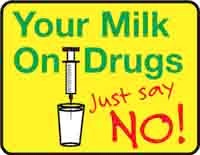rBGH & rBST—You Really Gonna Keep Eating this Crap?
Maybe you already know this, but I'm sharing this information from the Institute for Responsible Technology in case there are some of you out there that don't. My hope is that you'll get bugged enough to make a change in your dairy choices.

"Although banned in most other industrialized nations due to the health risks to humans and harm to animals, Monsanto's genetically engineered bovine growth hormone (rBGH or rBST) is still injected into dairy cows in the US to increase milk-production.
"So why was rBGH approved? Bottom line: manipulated research, and a corporate takeover of the US Food and Drug Administration. And US dairies aren't injecting this junk into their dairy herds now battle for their right to label their milk as rBGH-free."

If you have 9 minutes, you might want to view this video (found on the Institute for Responsible Technology site) that explains what these hormones are and exactly what they do to our dairy foods supply and what the effects on our health are predicted to be.
Your Milk on Drugs
-
Just Say No!
(8:54 min)
"Basically, milk from rBGH-treated cows has much higher levels of IGF-1, a hormone considered to be a high risk factor for breast, prostate, colon, lung, and other cancers. IGF-1 levels in milk from treated cows with rBGH can be up to 10 times higher. Studies suggest that pre-menopausal women below 50 years old with high levels of IGF-1 are seven times more likely to develop breast cancer. Men are four times more likely to develop prostate cancer. IGF-1 is implicated in lung and colon cancer.
"Research also shows that milk from cows injected with rBGH also has lowered nutritional value, increased antibiotics and more pus from infected udders. Cows given rBGH experience higher rates of mastitis, a painful udder infection. When treated with antibiotics that are also used for people, bacteria resistant to these antibiotics end up in the milk, air, soil and water, resulting in increased antibiotic resistance in humans, which is becoming a major health problem."

Many US schools have banned milk products from injected cows. More and more US dairies have refused to inject their cows with these drugs. And our national media networks are shining light on this problem. But there's SO MUCH profit loss at stake that Monsanto isn't taking this movement lying down. For instance, the potential link between rBGH and cancer was one of the topics revealed in a
four-part news series set to air in February of 1997 by a Tampa-based Fox TV station. Just before the series was to air, however, Fox received threatening letters from Monsanto's attorney, threatening "dire consequences for Fox News." The show was postponed indefinitely. The reporters who had created the series later testified that they were offered hush money to leave the station and never speak about the story again. They declined.
Over the past few years, several organizations have worked to raise awareness of the rBGH issue. Getting attention to the rBGH issue was slow at first, but by educating consumers about the health dangers associated with rBGH and producers making rBGH-free brands readily available, we have seen a widespread consumer demand for rBGH free dairy products. Within the last two years, Wal-Mart, Starbucks, Kroger, and about 40 of the 100 top dairies removed rBGH products as consumer concerns reached a tipping point on this issue.

You have to read labels, but you can definitely find rBGH- and rBST-free dairy if you look hard enough. (My favorite brand is Tillamook, available out here in the west. It's from a dairy on the Oregon Coast located in a town actually called Tillamook.) Let your grocery store manager know it's what you want. There's power in numbers and the more of us that decide we're not eating this crap, the quicker our retailers will get on board!
- www.responsibletechnology.org
- www.avma.org
- www.huffingtonpost.com
 Alice Osborne
Alice Osborne
Weekly Newsletter Contributor since 2006
Email the author! alice@dvo.com
